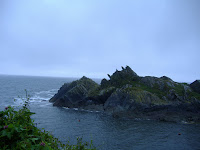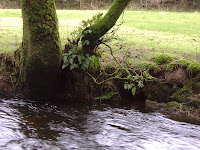
A time of stillness of reflection and thanks before the beginning of the Celtic New Year and the continuing journey into the winter with the dark Goddess.
The Dark Realms
Through the mists of other worlds,
Through the veil between,
Come to me in dream and trance,
Come by means unseen.
Lead me through the barren land,
Where leaves and needles fall,
Lead me to the darkened heath,
Where ghosts and demons call.
Take me to the world beyond,
A world of stick and bone,
Take me to the shadow realms,
The dwelling of the crone.
Let me see the well of death,
The cauldron of decay,
Let me come to know the hag,
Once crowned the 'Queen of May'.
Wisest Hecate, dark Calleach,
Who bring us loss and pain,
Lead us through the door of death,
That we may rise again.
From 'Mrs Darley's Pagan Whispers' by Carole Carlton
May the Goddess bring you blessings this Samhain
Through the mists of other worlds,
Through the veil between,
Come to me in dream and trance,
Come by means unseen.
Lead me through the barren land,
Where leaves and needles fall,
Lead me to the darkened heath,
Where ghosts and demons call.
Take me to the world beyond,
A world of stick and bone,
Take me to the shadow realms,
The dwelling of the crone.
Let me see the well of death,
The cauldron of decay,
Let me come to know the hag,
Once crowned the 'Queen of May'.
Wisest Hecate, dark Calleach,
Who bring us loss and pain,
Lead us through the door of death,
That we may rise again.
From 'Mrs Darley's Pagan Whispers' by Carole Carlton
May the Goddess bring you blessings this Samhain






